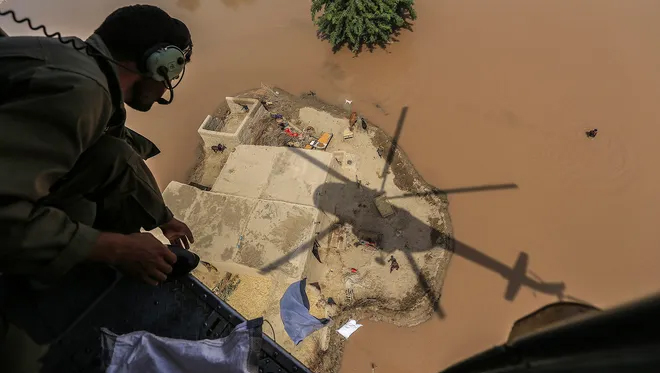Pakistan is one of the lowest contributors to global greenhouse emissions; however, it is one of those most vulnerable to climate change’s impacts. This has become more than clear in the past decade, especially with devastating floods displacing millions and setting a price tag of over $30 billion. International bodies have recognized the dire need for climate finance, especially the Green Climate Fund and the newly formed Loss and Damage Fund.
Pakistan has been on the receiving end, bagging $ 257.7 million from the Green Climate Fund for various projects. Nevertheless, meaningful progress in climate projects has not been achieved despite financial support. The underlying reason for this failure is not in the projects but rather in the inefficiencies, corruption, and poor governance of political and administrative institutions in Pakistan.
Pakistan was among the first and most vocal proponents for creating the Loss and Damage Fund, targeted to unlock access to finance for those facing irreversible climate-related losses. Coincidentally with the LDF, GCF has provided millions to numerous projects here in Pakistan to enhance resilience to climate change, decrease emissions, and upgrade the use of water resources. The likes of Recharge Pakistan, a program against flood risks and rehabilitation of the water system, were then touted as transformative initiatives.
Its biggest hurdle is the vast inefficiency of its bureaucracy. Climate finance from international sources, such as the GCF, has a strict framework that ensures proper monitoring, timely execution, and transparent usage of funds. Pakistan’s government agencies are struggling to meet the standards.

Another significant bottleneck is the complex approval procedures that climate projects must go through. Most funding proposals are evaluated by multiple ministries, agencies, and provincial governments before approval. Such a process inevitably creates an environment of delays. For instance, Pakistan’s climate-resilient agriculture program, approved in 2017, has scarcely seen the light of day because of red-tappism in scaling up sustainable farming practices. Politicians, many of whom have stakes in traditional agribusinesses, have further slowed progress. Sustainable practices threaten their profits, leading to deliberate stalling to maintain the status quo.
Even if the funds are allocated and released, mismanagement and poor coordination between governmental bodies make such translation of financial support into action on the ground impossible to materialize. For instance, when melts from glaciers start threatening people living in Northern Pakistan, projects aimed at countering the consequences of melting glaciers (GLOF) seem never to gain concrete ground. Local authorities often lack the technical capacity to implement initiatives.
The world and the funding countries of the GCF and the LDF are increasingly choosy about where they place their money. The consequences may be the application of more challenging conditions on the funding that Pakistan can get or even a reduction in the future.
This can be of particular concern for Pakistan, which will continue to seek much international aid to combat the rampant impacts of climate change. Pakistan’s requests for future climate funds, such as renewable energy, flood management in urban areas, and water resource management, will go up a steep hill if Pakistan cannot demonstrate that they can use these funds effectively.
There is a growing fear that if Pakistan does not show meaningful progress, it will be left behind in the global race for climate finance. Other developing countries are improving their governance and project management capabilities, which makes them vulnerable to being overlooked by climate financiers. The fight against climate change will be hard to fund because of this trajectory for a country that contributes little to global emissions but suffers disproportionately from climate impacts.
Finally, the localization of technical capacity in local and provincial governments needs to take place for better project implementation. The training programs for government officials and the partnership with the private sector and INGOS would help bridge the gap of skills needed in projects and meet international standards.
Securing Pakistan’s future through funding will mitigate climate challenges and shield its people from intensifying climate change effects, enabling meaningful climate action.
The writer can be contacted at 26020306@lums.edu.pk
Black glacier- Shishper glacier disaster in Hunza. Local volunteers carved path through steep rocks rescuing cattle, Nazir Sabir ( Famous Pakistani Mountaineer)







